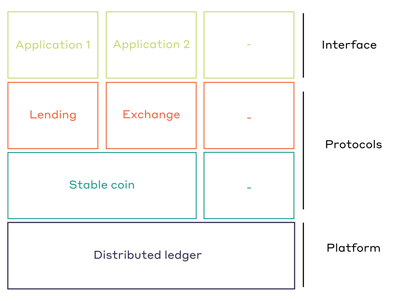Guest Author: Gehrig Kunz

Blockchain is a paradox. The technology made famous by bitcoin has simultaneously boundless disruptive potential and boisterous skeptics. Like most things, the truth is likely somewhere in the middle. As a startup founder, the question that really matters to you is often left unanswered – what can you really do with blockchain today?
One potential cause for confusion is understanding what problems blockchain helps solve and how useful it currently is. The crux of this begins with understanding if blockchain is an implementation detail. In other words, is blockchain just a database by a different tune, or is it truly an enabling technology, a platform for the next era of the trustless web?
Blockchain is a Database
A blockchain, or distributed ledger, is a database-like technology. A tool to get a job done. There are currently 700+ databases that can be the right tool for your use case. And blockchain is no different.
Similar to how you will choose a database best suited to handle your user data, analytics, search or IoT workload, blockchain has its own use case. Due to the architecture and design of a distributed ledger these use cases are centered around a few key areas.
Your typical database stores information that you fully control. It can be readily modified, withheld, or deleted by you. For most use cases this is okay, or even good. For cases that require greater trust, distributed ledgers can improve the integrity of your data, whether it is to prove the authenticity of a credential like your University degree or to find out where your organic coffee beans originated from.
This works by having a decentralized network, one not controlled by one or a few entities, like Amazon Web Service or popular cloud providers, but shared responsibility across many organizations or even individuals. When a transaction is sent to the network, it requires digital signatures to validate who is sending the information and that information is recorded with a timestamp agreed upon by the network in its entirety. This cryptographically secure record is then able to be verified by your user base or the broader public.
Manetu is one such startup using a distributed ledger to enhance the trust of a centralized process. Manetu offers a complete consumer privacy management solution, letting businesses give users direct access and trusted logs of the data the business stores on them. With each individual’s data request to consent, delete, or modify information, a transaction is sent to a public ledger. Users can then verify the information about themselves and any recent requests for greater transparency and an ability for the enterprise to better prove compliance regulations, such as GDPR, are met.
In simplified terms, blockchain and distributed ledgers are very good at answering exactly who entered or owns what data, when. As you can imagine this can be most helpful to your startup if your business is exchanging items or information of value or streamlining processes between multiple parties.
Blockchain is a Platform
While companies are augmenting existing applications, systems, and processes with blockchain, there is also a counter-culture movement building towards a more decentralized future.
The case can be made that, similarly to the introduction of the Internet or mobile devices, blockchain is a platform for entrepreneurs to create an entirely new class of application and value.
On top of the platform you see, protocols and applications are being built for which no single individual or company is responsible; they are owned and governed by their decentralized community. They just work, without a traditional company or intermediary behind them.
The most momentum in this movement is in decentralized finance, or defi. In the defi space, you can freely exchange value, buy unique digital items, and manage loans. Each portion of an application is powered by open protocols not owned by Facebook or a bank, but using a collection of autonomous smart contracts. These smart contracts are composable, meaning they can plug and play nicely with each other like Lego bricks to form powerful applications. These decentralized applications are inherently new to the world with much research to be done, but the potential is there. Collectively, they will eat away at the financial world to create more efficiency, transparency, and trust into these inarguably archaic institutions. And finance is only one area that will face this disruption. Similar disintermediation and autonomous interactions can be deployed in nearly every industry and horizontal web standard, like identity.
These decentralized applications are inherently new to the world with much research to be done, but the potential is there. Collectively, they will eat away at the financial world to create more efficiency, transparency, and trust into these inarguably archaic institutions. And finance is only one area that will face this disruption. Similar disintermediation and autonomous interactions can be deployed in nearly every industry and horizontal web standard, like identity.
What’s Right For You
While most of the world’s first interaction with blockchain will likely come unbeknownst to them in the form of a database, such as USPS’s recently-patented vote verification database, the future seems to be headed towards decentralized protocols and applications owned and run by their communities. As you are building your startup, consider where and how much trust is required.
If your business requires quick wins, consider a distributed ledger to be a helpful tool to increase the transparency, auditability, or efficiency of a transaction between parties. It could be a growing area to better establish a competitive advantage. For those more forward-looking, distributed ledgers present a nascent opportunity for unlocking the next era of Web 3.0.
About Gehrig Kunz
Gehrig Kunz is a 1871 mentor and has worked with some of the world’s top open source databases and developer tools in various marketing, growth, and community roles. Currently, Gehrig helps startups build on Hedera Hashgraph, a scalable public ledger owned and operated by leading organizations.


